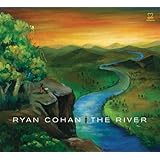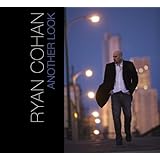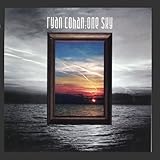 Ryan Cohan has a new CD called "The River" (Motema 2013). The music flows from his experiences in Eastern Africa with his quartet in 2008. He connects the 14 piece set with six segments called "River" with the river symbolizing for him the constant motion, changing patterns, and essence of jazz. His exposure to new rhythmic patterns, African instruments, and the overall cultures of Rwanda, Congo, Zimbabwe, and Congo inspired these compositions, which describe his journey and the ever changing landscape of his visit.
Ryan Cohan has a new CD called "The River" (Motema 2013). The music flows from his experiences in Eastern Africa with his quartet in 2008. He connects the 14 piece set with six segments called "River" with the river symbolizing for him the constant motion, changing patterns, and essence of jazz. His exposure to new rhythmic patterns, African instruments, and the overall cultures of Rwanda, Congo, Zimbabwe, and Congo inspired these compositions, which describe his journey and the ever changing landscape of his visit.  Cohan, 42, is from Chicago and is a graduate of the DePaul School of Music (1993). He has performed as a session pianist with Freddie Hubbard, Regina Carter, and Milt Hinton, and was a protege of Ramsey Lewis, who has recorded many of Cohan's compositions. He first came to my attention with his recording "Another Look" (Motema 2010), a straight ahead recording of nine original compositions alongside two covers including a very energetic romp through "Caravan." The band included Joe Locke on vibes, Geof Bradfield on saxes and bass clarinet, Lorin Cohen on bass, Kobie Watkins on drums and Steve Kroon on percussion. The arrangements pop with energy and his solos and improvisations are full of life and imagination. It's straight ahead jazz that stands out from the crowd with its rich ensemble play.
Cohan, 42, is from Chicago and is a graduate of the DePaul School of Music (1993). He has performed as a session pianist with Freddie Hubbard, Regina Carter, and Milt Hinton, and was a protege of Ramsey Lewis, who has recorded many of Cohan's compositions. He first came to my attention with his recording "Another Look" (Motema 2010), a straight ahead recording of nine original compositions alongside two covers including a very energetic romp through "Caravan." The band included Joe Locke on vibes, Geof Bradfield on saxes and bass clarinet, Lorin Cohen on bass, Kobie Watkins on drums and Steve Kroon on percussion. The arrangements pop with energy and his solos and improvisations are full of life and imagination. It's straight ahead jazz that stands out from the crowd with its rich ensemble play.  The next CD I found was "One Sky" (Motema 2007) which predates "Another Look". It has eleven tracks including five that made up the extended work "One Sky: Tome Poems for Humanity." The writing here is a bit more adventerous and impressionistic with shades of Herbie Hancock or Chick Corea, particularly in the extended suite, but the overall CD is east to listen to and retains the energy and bright sounds from the previous outing. The sextet for this outing includes James Cammack or Larry Cohen on bass, Geof Bradfield on soprano and tenor saxes and bass clarinet; Bob Sheppard on flutes, soprano and tenor saxes; Kobie Watkins on drums, and Ruben Alvarez on shekere. Cohan's solo play on "Lush Life" is a really fine demonstration of Cohan's abundant playing skills to go with his excellent compositional abilities.
The next CD I found was "One Sky" (Motema 2007) which predates "Another Look". It has eleven tracks including five that made up the extended work "One Sky: Tome Poems for Humanity." The writing here is a bit more adventerous and impressionistic with shades of Herbie Hancock or Chick Corea, particularly in the extended suite, but the overall CD is east to listen to and retains the energy and bright sounds from the previous outing. The sextet for this outing includes James Cammack or Larry Cohen on bass, Geof Bradfield on soprano and tenor saxes and bass clarinet; Bob Sheppard on flutes, soprano and tenor saxes; Kobie Watkins on drums, and Ruben Alvarez on shekere. Cohan's solo play on "Lush Life" is a really fine demonstration of Cohan's abundant playing skills to go with his excellent compositional abilities.
In looking over his profile on his website, there are two early CDs by Cohan that I have not heard called "Here and Now" (Sirocco 2001) and "Real World".
 "The River", his latest, is a departure from his usual western jazz style and is simply outstanding. Cohan has written and arranged fourteen pieces that capture the spirit of his trip, the sights and sounds of East Africa, and the rhythms and melodies of the music and instruments he heard. The band includes Bradfield, Cohen and Watkins once more, along with John Wojciechowski on tenor and soprano saxes and flutes, Tito Carrillo on trumpet and flugelhorn, and Samuel Torres on percussion.
"The River", his latest, is a departure from his usual western jazz style and is simply outstanding. Cohan has written and arranged fourteen pieces that capture the spirit of his trip, the sights and sounds of East Africa, and the rhythms and melodies of the music and instruments he heard. The band includes Bradfield, Cohen and Watkins once more, along with John Wojciechowski on tenor and soprano saxes and flutes, Tito Carrillo on trumpet and flugelhorn, and Samuel Torres on percussion.  The pieces are linked by the ever evolving "River", a mini-suite of short pieces (one to about three minutes) in six parts sprinkled throughout the set and serving as an introduction as well as a coda. The suite has six subtitles -- Departure, Dark Horizon, Aftermath, Beautiful Land, Connection and Coming Home. The first, "Departure" is a solo piano piece that traces the start of the journey using a simple tune in a standard "western" style. Later parts of "River" have other members playing short solos/duets -- two soprano saxes for "Dark Horizon", the flugelhorn for "Aftermath", bass for "Beautiful Land", drums and percussion for "Connection", and finally everyone for "Coming Home", a truly uplifting and spirited ending to the set.
The pieces are linked by the ever evolving "River", a mini-suite of short pieces (one to about three minutes) in six parts sprinkled throughout the set and serving as an introduction as well as a coda. The suite has six subtitles -- Departure, Dark Horizon, Aftermath, Beautiful Land, Connection and Coming Home. The first, "Departure" is a solo piano piece that traces the start of the journey using a simple tune in a standard "western" style. Later parts of "River" have other members playing short solos/duets -- two soprano saxes for "Dark Horizon", the flugelhorn for "Aftermath", bass for "Beautiful Land", drums and percussion for "Connection", and finally everyone for "Coming Home", a truly uplifting and spirited ending to the set.
"River: Departure" is a lovely start, and is immediately followed by "Call and Response", a chance for each instrument to introduce itself using the same theme as from the introduction. A nice musical way to get everyone involved, it is simple and effective as it transitions the CD to the African continent. The intensity grows during the piece, Watkins' drumming takes a firmer grip on the rhythms, and everyone plays in unison.
The other pieces are equally compelling. Once "Call and Response" is done, we are in Africa and the rhytyms and harmonies, along with the use of African percussion insturments, states that clearly. "Arrival" is driven by the drums and percussion, with the soprano sax leading the theme with the support of the others. As the song grows, the others join in but the piece is really a triumph for the soprano (either Wojciechowski or Bradfield) and later Cohan on his piano part/lead. The tie between the Eastern African and Latin Caribbean beat is very clear, and the spirit of this energetic song is jubilant. Action and adventure are evident in the next piece "Storm Rising" and the band captures the conflicts nicely in a rather free middle sextion of the piece, followed by a driving solo from Cohan and then a back and forth exchange between the trumpet, saxes, and others including a very strong part from the percussion section. "Foresaken" is a tour de force for the trumpet of Carrilo, playing a tune full of emotional stress, intense feelings, and finally sadness as it closes. "Brother Fifi" follows with a more uplifting piece and a chance for the bass to shine, along with Cohan's piano and the flute of Wojciechowski. Later, "Kampala Moon" is a beautiful ode to the moon that captures the spirit of the nightime sky over Uganda. And "Last Night at The Mannenberg" is a lively, toe tapping piece that engages the full band in a spirited, joyful ending.
Marvelous music that must be heard. Jazz with an Afro-Latin jazz beat that is distinctive and uplifing played by a full-throated ensemble. Ryan Cohan is a name to watch as his music continues to evolve.
No comments:
Post a Comment